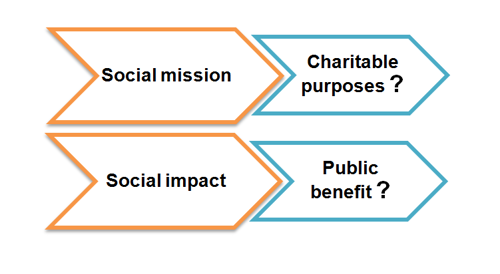4. How does OSCR decide if a Social Enterprise can be a charity?
We apply the charity test to Social Enterprises in the same way as any other organisation wishing to become a charity.
Charitable purposes
All Social Enterprises have a social mission: a primary objective to achieve social and/or environmental benefit, and aim to achieve a social impact. However, there is no guarantee that the social mission will consist of exclusively charitable purposes.
We look to see if the purposes in the governing document are entirely charitable and consistent with one or more of the charitable purposes set out in the 2005 Act.
Public benefit
If the organisation has only charitable purposes then we look at whether its social impact provides (or intends to provide) public benefit.

Sometimes the connection between the social mission and charitable purposes, and the social impact and public benefit is obvious, sometimes it is not. If it’s not, then we will need to ask more questions about the Social Enterprise - see question 6 for more detail.
Use of assets
An organisation will fail the charity test if its governing document allows it to use any of its assets for a purpose that is not a charitable purpose under the 2005 Act. This applies during the lifetime of the organisation and when the organisation is being wound up.
A charity’s governing document must not allow profits from trading to be paid to members, shareholders or other individuals as dividends or bonuses.
How we make our decision
We look at the organisation’s governing document, the whole picture of what the organisation does (or plans to do), and the benefit the activities provide. We also look at any private benefit, disbenefit or undue restriction.
For more information see: Meeting the Charity Test Guidance.
OSCR regulates Social Enterprise charities in the same way as any other charity.
